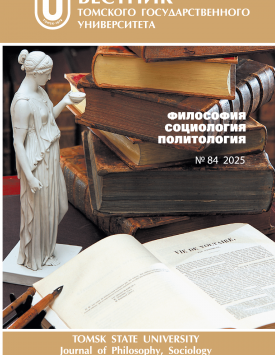Priority of social factors in terminology through the prism of main historical prerequisites: a socio-philosophical approach
The article examines the subject-specific features and functions of terminology (terminological activity) through the prism of the main historical and philosophical premises of the latter, as well as the factor of social priorities in its functioning and development. Considering that today terminology is recognized as a separate independent sphere of human activity, a scientific discipline, a profession that has great prospects in the structure of future specialties, researchers pay attention to the problematic state of the subject field of terminology and seek to clarify it by referring to the types of activity that acted as its historical premises. In addition, it is argued that the diversity of the presented premises through a socio-philosophical approach allows them to be integrated within the space of terminological activity, due to which the problematic aspects of terminological activity in the modern world are clarified. The work aims to identify the historical premises of terminology and show the proximity of the problematic field and functions of the designated historical premises with its similar aspects, as well as to demonstrate that the factor of social priorities is an imperative mechanism for managing and integrating their main subject-specific features and functions in terminological work. The following subject areas and activities have been identified as the main historical prerequisites for terminology: linguophilosophy (philosophy of language), the development of scientific terminology in the New Age, engineering, and translation. These are far from all the historical prerequisites for terminology (for example, linguistics and information technology are not represented), but the above-mentioned grounds most fully express the specifics of terminology’s subject field. It is substantiated that the historically first prerequisite for terminology is linguophilosophy, which arose in antiquity. Within its framework the main questions requiring their solution both in the philosophy of language and in terminology are formed: a cognitive question (To what extent is language capable of expressing true knowledge?), a communicative question (To what extent does language contribute to the achievement of understanding by the participants in communication?), and a synthetic (cognitive-communicative) question (To what extent does language contribute to the achievement of both truth and understanding?). The second historical prerequisite is the development of New Age science with its transition to national languages as a linguistic basis for scientific terminology. On the one hand, the necessity of universality of the language of science (terminology) as a way of ensuring the key function of science - achieving truth (cognitive) - is emphasized; on the other hand, there is a complexity of the communicative plan associated with the fact that scientists use different linguistic bases - national languages, which does not contribute to achieving understanding in professional communication, since terminology based on national languages has significant cognitive differences. The third historical premise of terminology is recognized as engineering activity, as a result of which mass production and mass use of engineering products are formed by common people who do not know professional terminology, but, as main consumers, need to master terminology to be able to use products at the consumer level. Here, the communicative function of terminology is actualized by bringing certain cognitive knowledge and skills to people. Translation activity is considered as the fourth historical premise, in the process of which the communicative function is dominant, but the cognitive function should be preserved to the extent that the translation allows preserving the truth of the knowledge being translated from one language to another. It is substantiated that the priority of social factors in the process of implementing terminological activity lies in the fact that these factors play a decisive role in combining the cognitive and communicative functions of terminology. An analysis of the historical prerequisites of terminology confirms this thesis. The authors declare no conflicts of interests.
Keywords
socio-philosophical approach, communicative function, subject area, cognitive function, social priority, historical background, terminologyAuthors
| Name | Organization | |
| Ardashkin Igor B. | Tomsk Polytechnic University | ibardashkin@tpu.ru |
| Ardashkina Aleksandra I. | Tomsk Polytechnic University; Tomsk State University | ardashkinaai@mail.ru |
References

Priority of social factors in terminology through the prism of main historical prerequisites: a socio-philosophical approach | Tomsk State University Journal of Philosophy, Sociology and Political Science. 2025. № 84. DOI: 10.17223/1998863X/84/8
